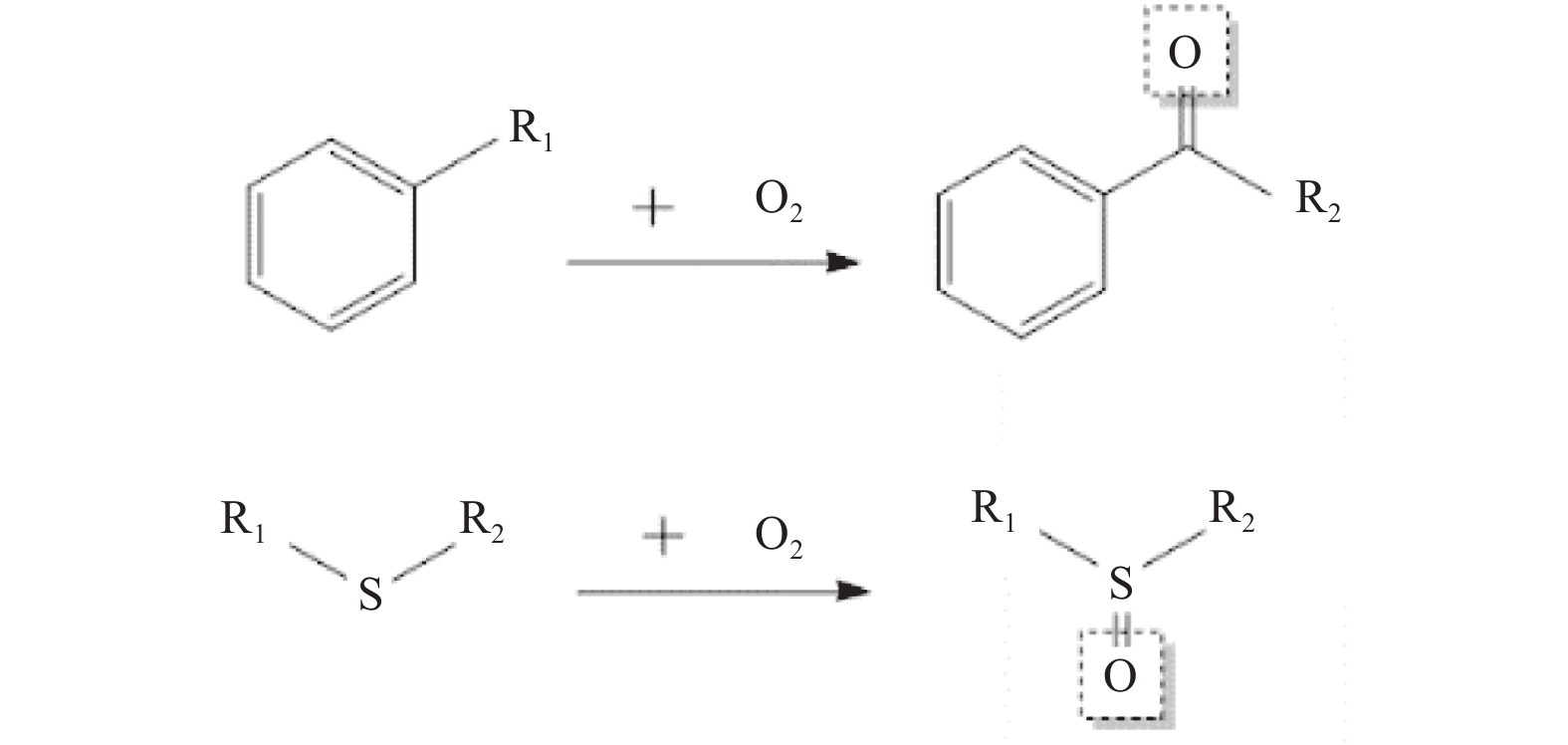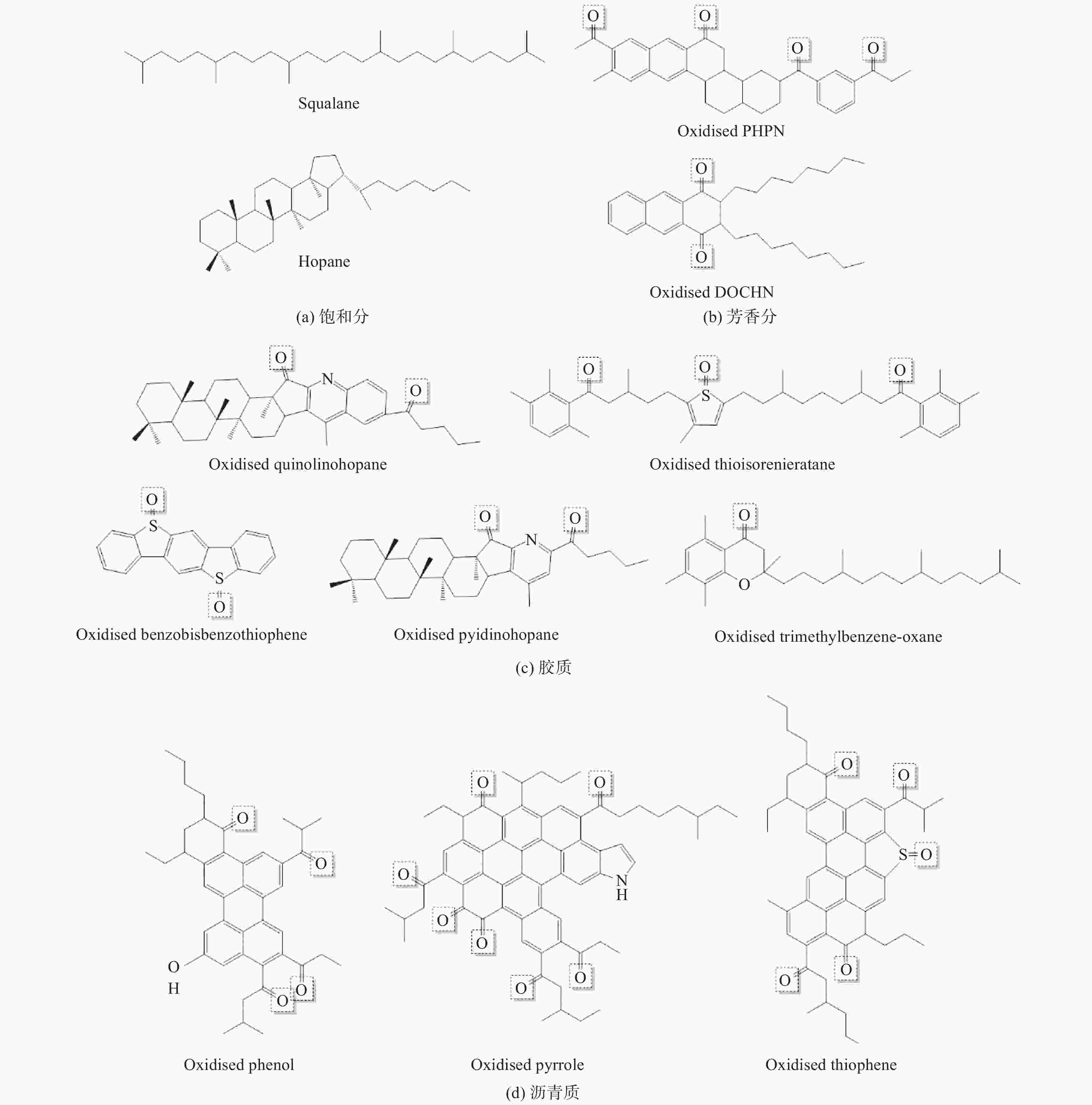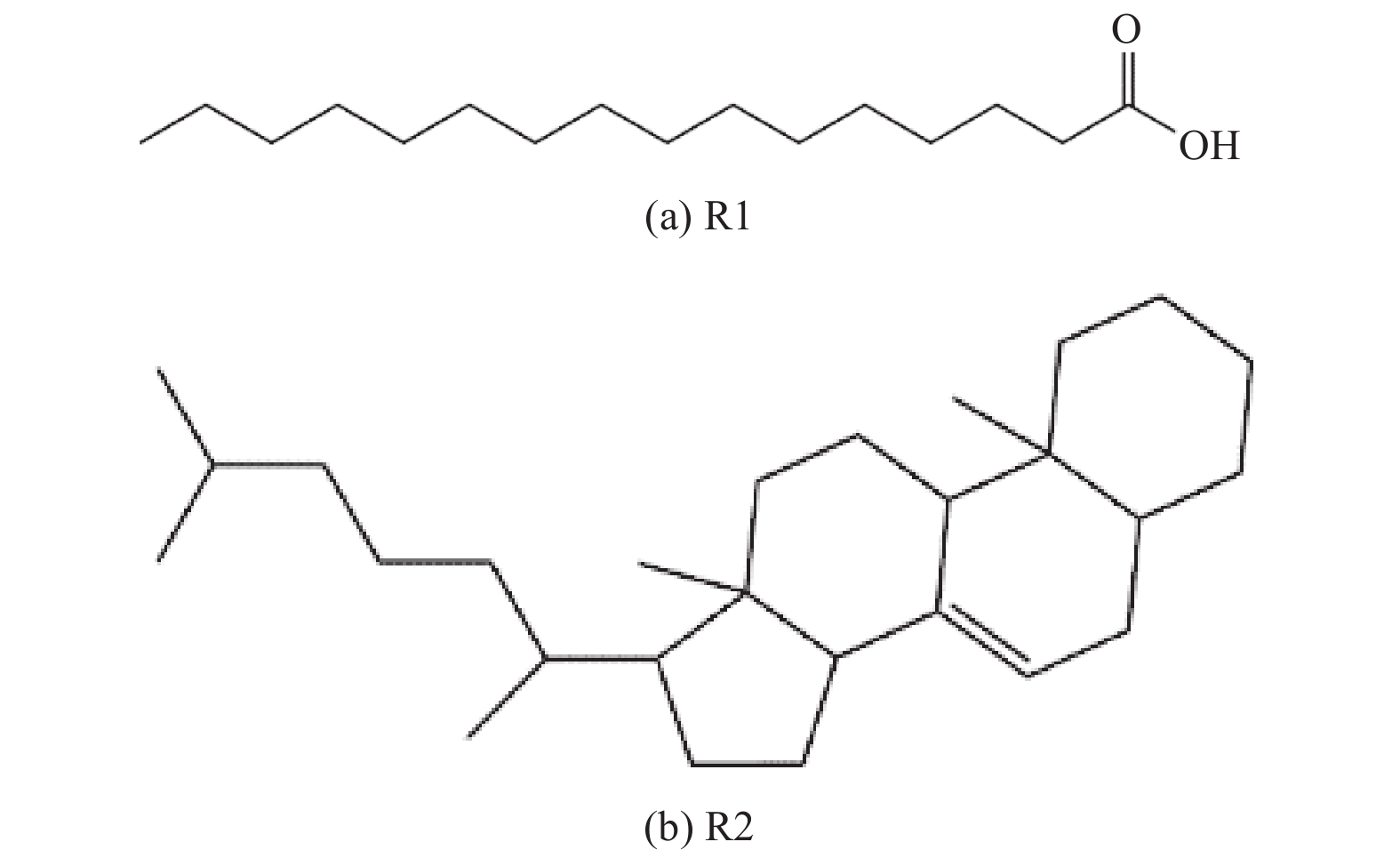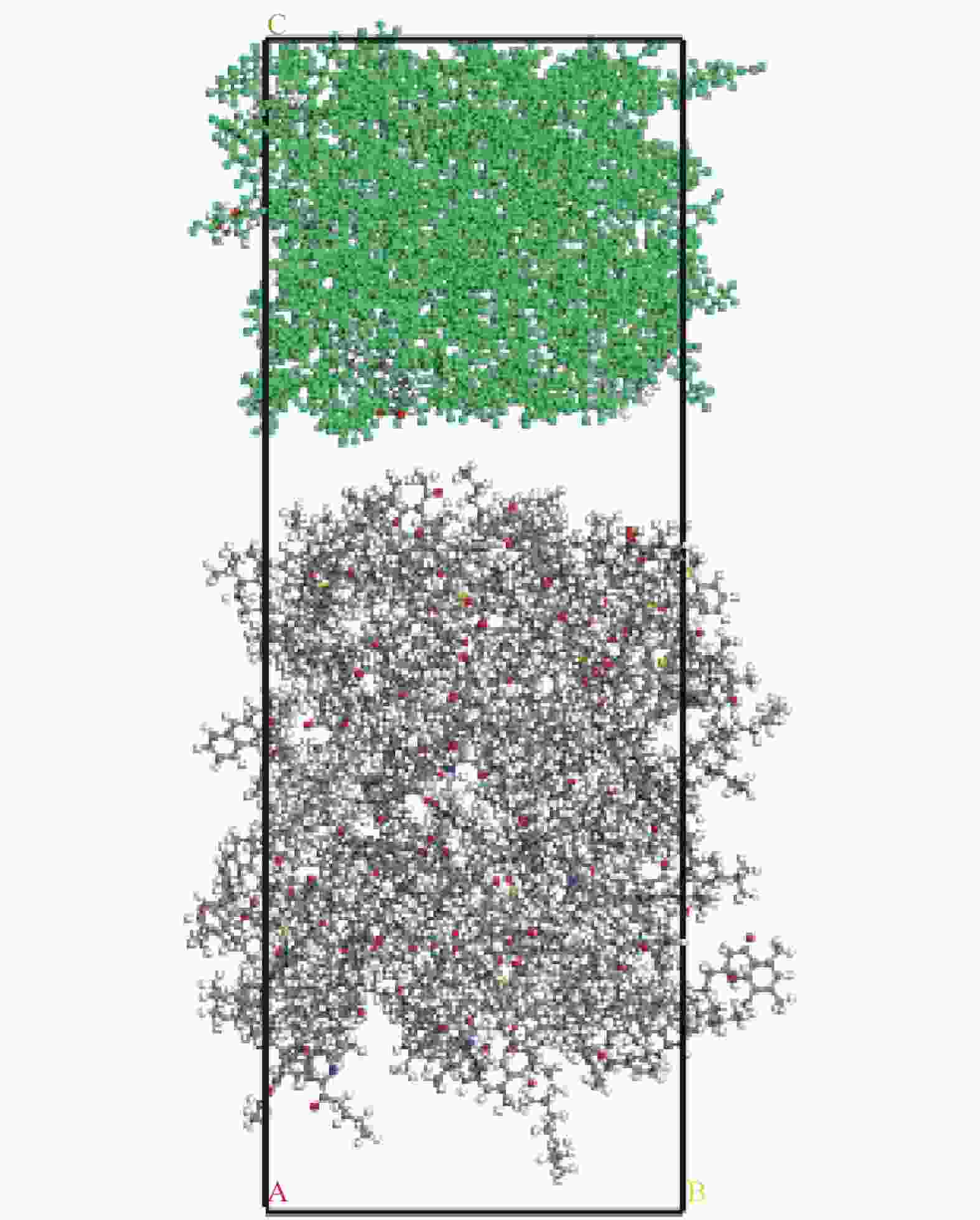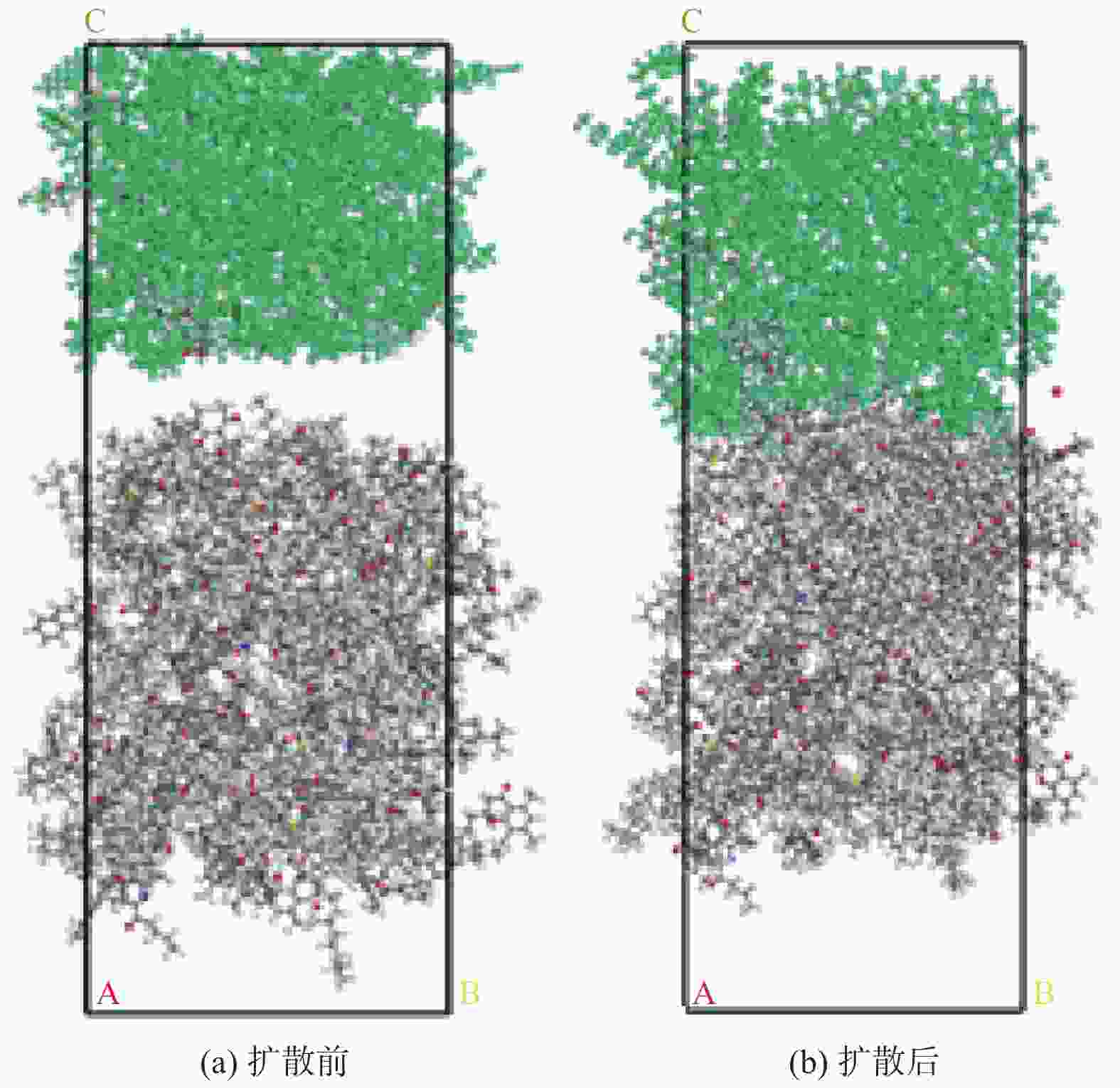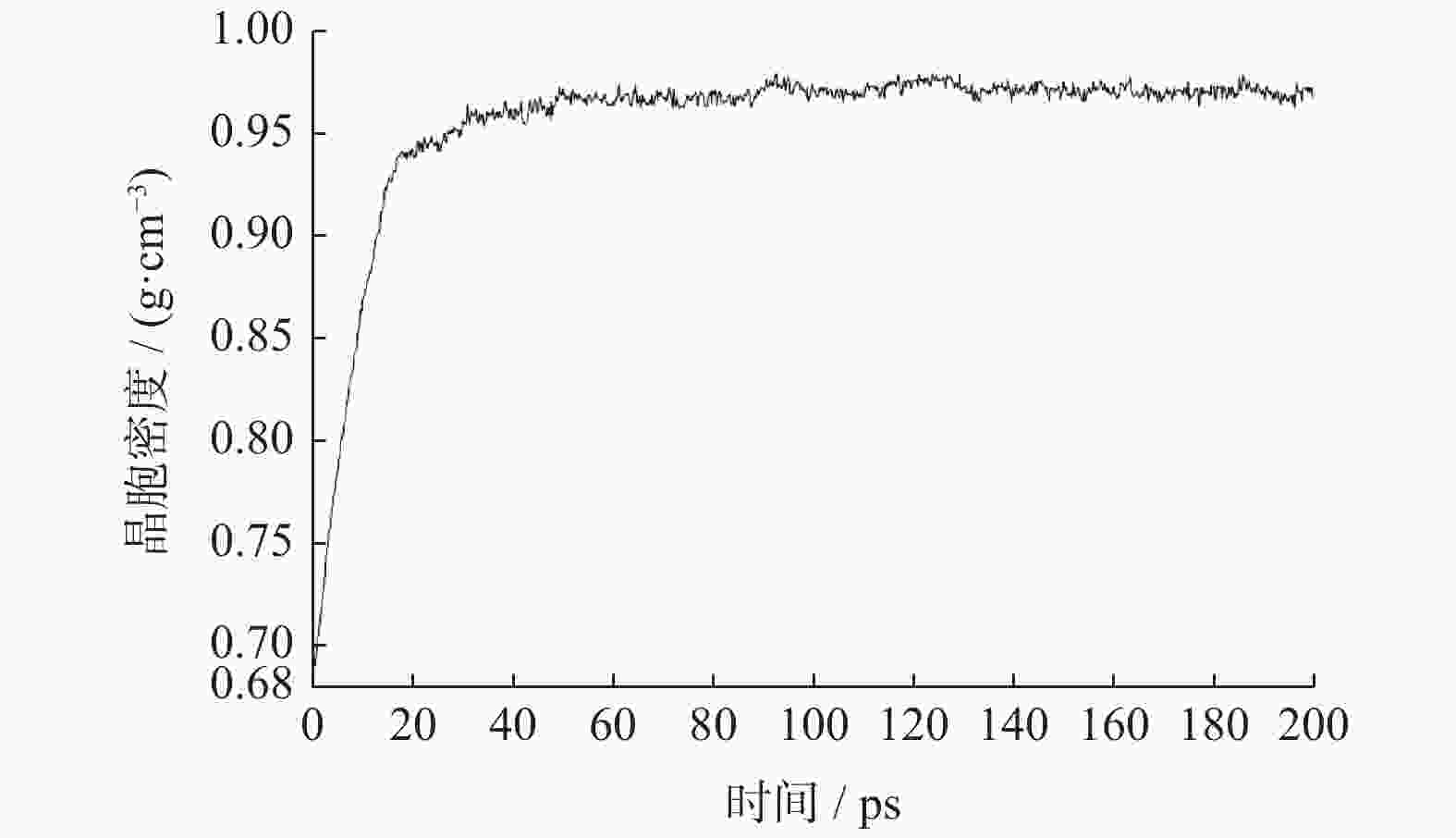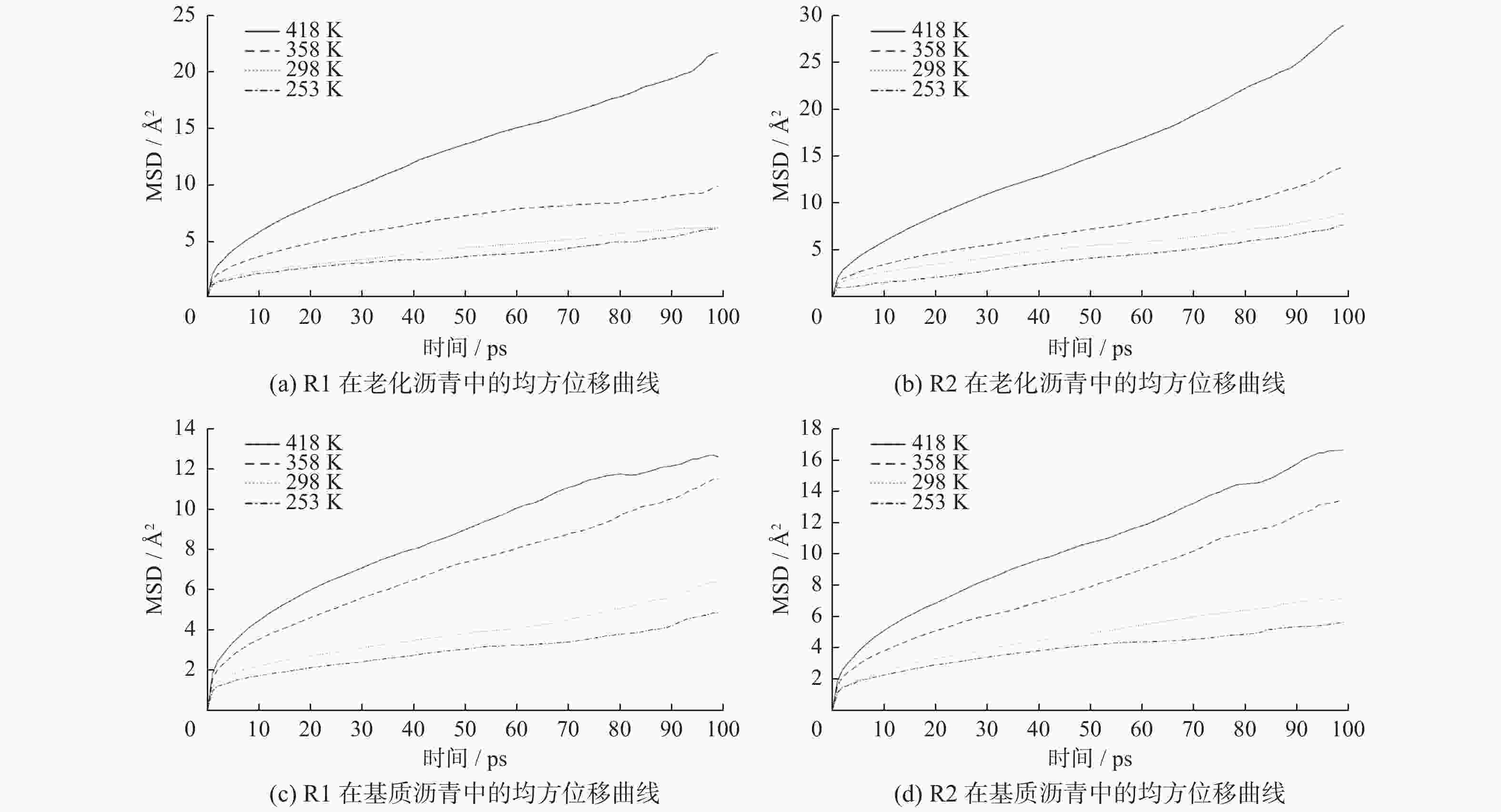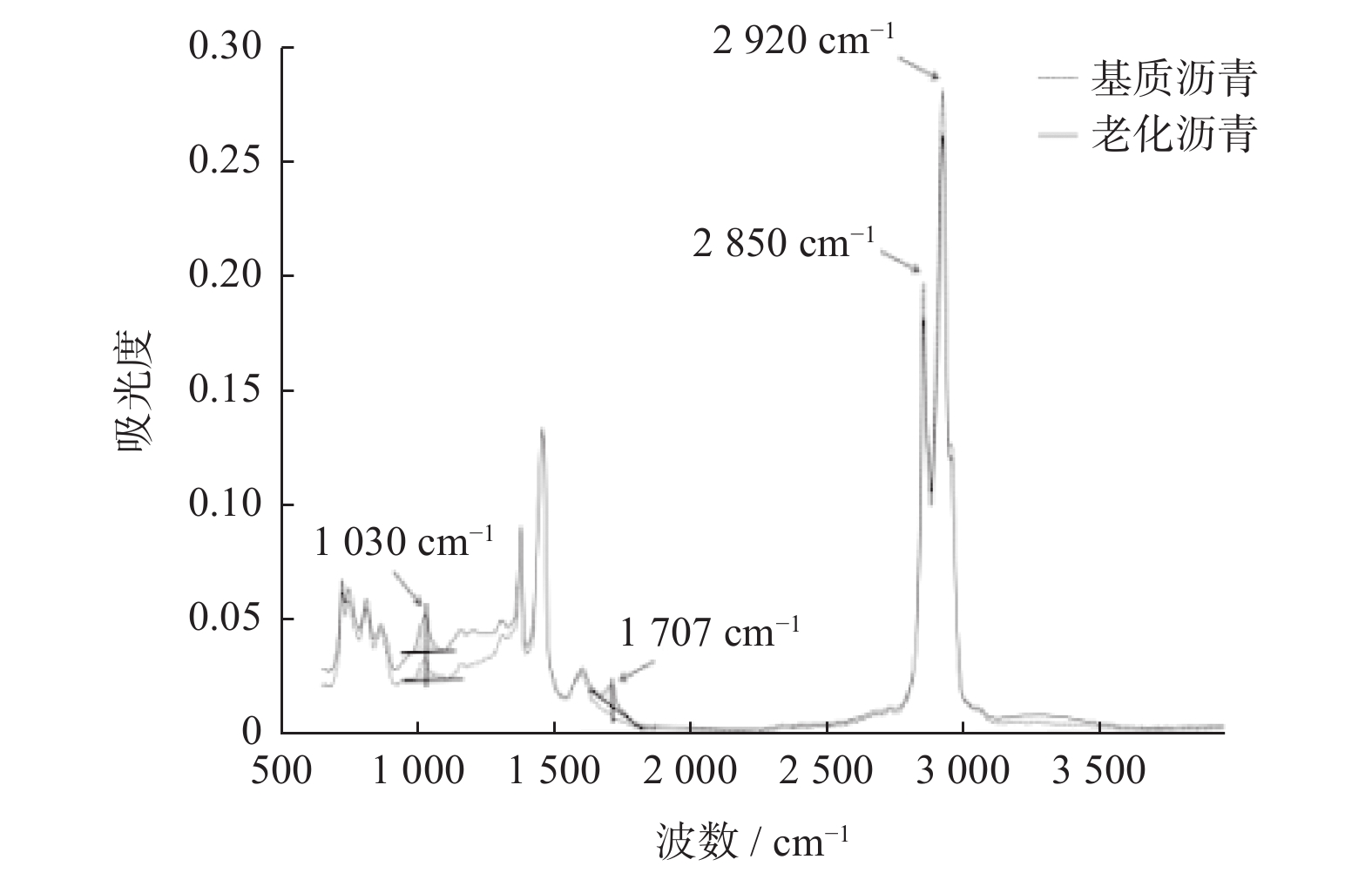Study on fusion diffusion characteristics of bio-based rejuvenator-asphalt at micro scale
-
摘要:
运用分子动力学方法构建生物再生剂−沥青模型,通过微观模拟探究再生剂−沥青的融合扩散行为. 首先采用FTIR试验结合SARA模型确定老化前后的12种沥青分子结构,选用动物废弃物生物再生剂的主要成分类固醇和羧酸,建立沥青−再生剂的扩散体系分子动力学模型. 采用密度、相容性指标验证分子动力学模型的可靠性,分析不同温度、老化状态下生物再生剂在基质沥青与老化沥青中的融合扩散行为. 结果表明:生物再生剂在老化沥青中的扩散系数高于在基质沥青中的扩散系数;在相同温度下类固醇的扩散性能优于羧酸;两种生物再生剂的扩散系数随着温度升高而升高,高温条件下体系动能更大,使体系分子更容易摆脱分子力的约束.
Abstract:The molecular dynamics method was used to construct the bio-based rejuvenator-asphalt model, and the fusion diffusion behavior of bio-based rejuvenator-asphalt was investigated by microscopic simulation. Firstly, the FTIR test combined with the SARA model was used to determine the molecular structure of 12 kinds of asphalt before and after aging. And the main components of animal waste bio-based rejuvenators including steroids and carboxylic acids were selected to establish the molecular dynamics model of the asphalt-rejuvenator diffusion system. Furthermore, the density and compatibility index were used to verify the reliability of the molecular dynamics model, and the fusion diffusion behavior of bio-based rejuvenator in virgin asphalt and aged asphalt were analyzed under different temperatures and aging conditions . The results show that the diffusion coefficients of bio-based rejuvenator in aged asphalt is higher than that in virgin asphalt. The diffusion performance of steroids is better than carboxylic acids at the same temperature. The diffusion coefficients of two bio-based rejuvenators increase with the increase of temperature, since the greater kinetic energy at high temperature makes it easier for the system molecules to get rid of the constraint of molecular force.
-
Key words:
- aged asphalt /
- molecular dynamics /
- bio-based rejuvenator /
- diffusion coefficient /
- temperature
-
表 1 沥青老化前后性能指标
Table 1. Performance indexes of asphalt before and after aging
样品 针入度/ 0.1 mm 软化点/ °C 延度/ cm 基质沥青 66 46.0 122.0 老化沥青 25 65.0 34.5 表 2 沥青模型的分子组成
Table 2. Molecular compositions of asphalt model
组分 分子 老化前 老化后 分子式 分子数量 质量分数/% 分子式 分子数量 质量分数/% 饱和分 Squalane C30H62 7 15.9 C30H62 6 14.9 Hopane C35H62 7 C35H62 7 芳香分 PHPN C35H44 18 42.3 C35H36O4 13 33.3 DOCHN C30H46 21 C30H42O2 15 胶质 Quinolinohopane C40H59N 2 25.9 C40H55NO2 2 30.2 Thioisorenieratane C40H60S 2 C40H56O3S 2 Benzobisbenzothiophene C18H10S2 3 C18H10O2S2 4 Pyridinohopane C36H57N 2 C36H53NO2 2 Trimethylbenzene-oxane C29H50O 15 C29H48O2 17 沥青质 Asphaltene-phenol C42H54O 3 15.9 C42H46O5 4 21.6 Asphaltene-pyrrole C66H81N 2 C66H67NO7 3 Asphaltene-thiophene C51H62S 4 C51H54O5S 4 表 3 沥青的内聚能密度和溶解度参数
Table 3. Cohesive energy density and solubility parameter of asphalt
范德华力/
(J•cm−3)0.5库仑静电力/
(J•cm−3)0.5CED/
(108J•cm−3)模拟值/
(J•m−3)0.5试验值/
(J•cm−3)0.518.40 1.22 3.40 18.44 13.30~22.50 表 4 生物再生剂在不同温度下的扩散系数
Table 4. Diffusion coefficient of bio-based rejuvenator at different temperatures
(10−10m2• s−1) 扩散体系 温度/K 253 298 358 418 老化沥青-R1 0.70 0.78 1.17 3.00 老化沥青-R2 1.07 1.10 1.67 4.00 基质沥青-R1 0.53 0.75 1.50 1.67 基质沥青-R2 0.65 0.93 1.83 2.33 -
[1] 张文,龙军,任强, 等. 沥青质分子聚集行为研究进展[J] . 化工进展,2019,38(5):2158 − 2163. [2] ZAUMANIS M, MALLICK R B, POULIKAKOS L, et al. Influence of six rejuvenators on the performance properties of Reclaimed Asphalt Pavement (RAP) binder and 100% recycled asphalt mixtures[J] . Construction and Building Materials,2014,71:538 − 550. doi: 10.1016/j.conbuildmat.2014.08.073 [3] 徐刚, 杨军, 朱浩然, 等. 生物再生剂再生效率研究[J] . 石油沥青,2017,31(1):14 − 20. doi: 10.3969/j.issn.1006-7450.2017.01.003 [4] 高新文, 刘朝晖. 生物油再生沥青自愈合机理分析[J] . 中国公路学报,2019,32(4):235 − 242. [5] 季节, 李鹏飞, 杨松, 等. 生物型沥青再生剂对老化沥青再生性能的影响[J] . 石油沥青,2015,29(4):1 − 6. doi: 10.3969/j.issn.1006-7450.2015.04.001 [6] BOWERS B F, HUANG B S, SHU X, et al. Investigation of reclaimed asphalt pavement blending efficiency through GPC and FTIR[J] . Construction and building materials,2014,50:517 − 523. doi: 10.1016/j.conbuildmat.2013.10.003 [7] MOHAJERI M, MOLENAAR A A A, VAN DE VEN M F C. Experimental study into the fundamental understanding of blending between reclaimed asphalt binder and virgin bitumen using nanoindentation and nano-computed tomography[J] . Road Materials and Pavement Design,2014,15(2):372 − 384. doi: 10.1080/14680629.2014.883322 [8] MA T, HUANG X M, ZHAO Y L, et al. Evaluation of the diffusion and distribution of the rejuvenator for hot asphalt recycling[J] . Construction and Building Materials,2015,98:530 − 536. doi: 10.1016/j.conbuildmat.2015.08.135 [9] CONG P L, HAO H J, ZHANG Y H, et al. Investigation of diffusion of rejuvenator in aged asphalt[J] . International Journal of Pavement Research and Technology,2016,9(4):280 − 288. doi: 10.1016/j.ijprt.2016.08.001 [10] XU G J, WANG H, SUN W. Molecular dynamics study of rejuvenator effect on RAP binder: Diffusion behavior and molecular structure[J] . Construction and Building Materials,2018,158:1046 − 1054. doi: 10.1016/j.conbuildmat.2017.09.192 [11] ZADSHIR M, HOSSEINNEZHAD S, FINI E H. Deagglomeration of oxidized asphaltenes as a measure of true rejuvenation for severely aged asphalt binder[J] . Construction and Building Materials,2019,209:416 − 424. doi: 10.1016/j.conbuildmat.2019.03.090 [12] MENG F, MA S, MUHAMMAD Y, et al. Analysis of virgin asphalt brands via the integrated application of FTIR and gel permeation chromatography[J] . Arabian Journal for Science and Engineering,2020,45(10):7999 − 8009. doi: 10.1007/s13369-020-04539-x [13] HOU X D, LYU S T, CHEN Z, et al. Applications of fourier transform infrared spectroscopy technologies on asphalt materials[J] . Measurement,2018,121:304 − 316. doi: 10.1016/j.measurement.2018.03.001 [14] LI D D, GREENFIELD M L. Chemical compositions of improved model asphalt systems for molecular simulations[J] . Fuel,2014,115:347 − 356. doi: 10.1016/j.fuel.2013.07.012 [15] FINI E H, KALBERER E W, SHAHBAZI A. Biobinder from swine manure: Sustainable alternative for asphalt binder[C]// Proceedings of Transportation Research Board 90th Annual Meeting. Washington DC: Transportation Research Board, 2011. [16] PAHLAVAN F, MOUSAVI M, HUNG A M, et al. Characterization of oxidized asphaltenes and the restorative effect of a bio-modifier[J] . Fuel,2018,212:593 − 604. doi: 10.1016/j.fuel.2017.10.090 [17] HUANG M, ZHANG H L, GAO Y, et al. Study of diffusion characteristics of asphalt-aggregate interface with molecular dynamics simulation[J] . International Journal of Pavement Engineering,2019,22(3):319 − 330. doi: 10.1080/10298436.2019.1608991 [18] WANG P, DONG Z J, TAN Y Q, et al. Investigating the interactions of the saturate, aromatic, resin, and asphaltene four fractions in asphalt binders by molecular simulations[J] . Energy & Fuels,2015,29(1):112 − 121. -





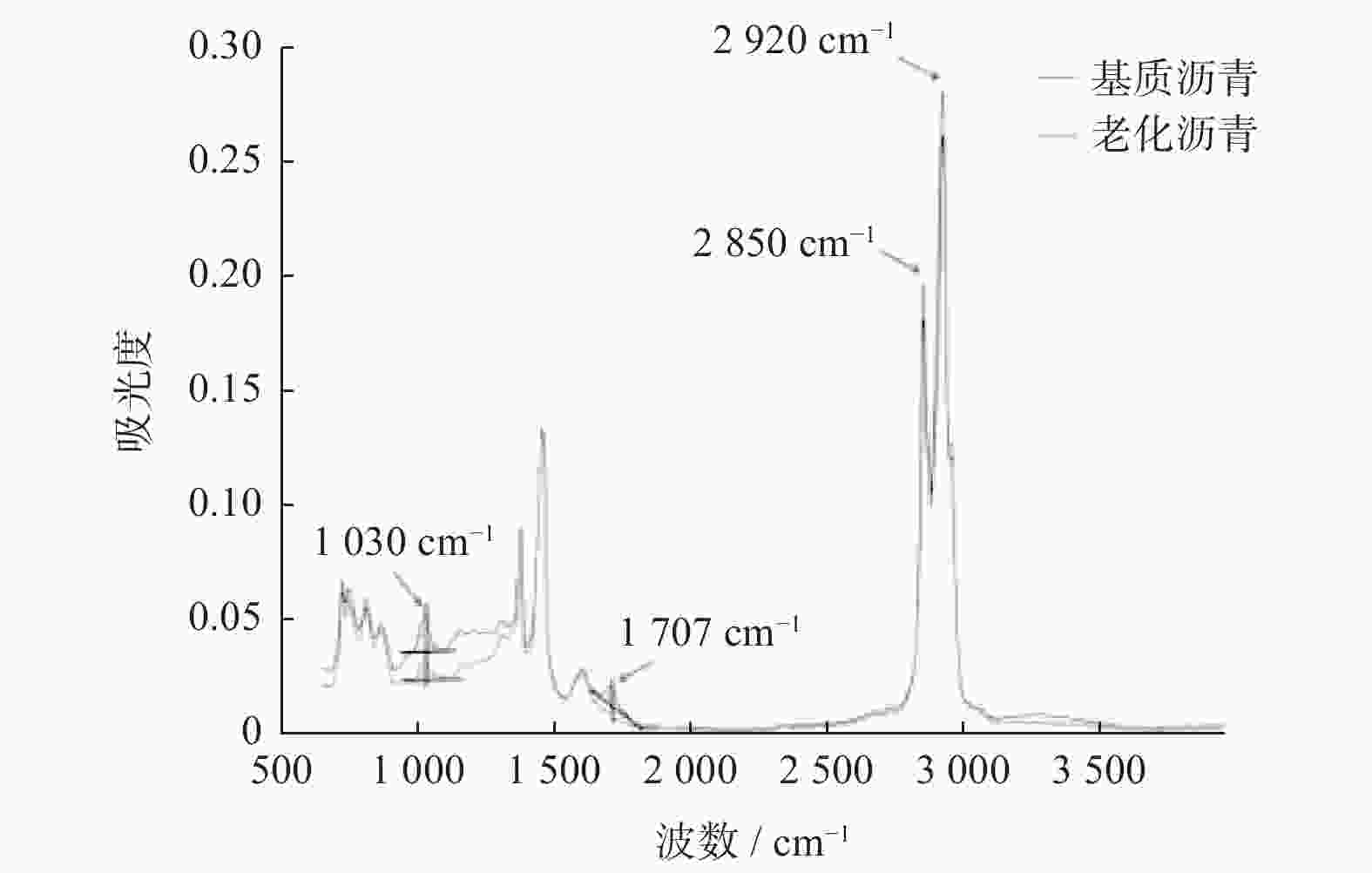
 下载:
下载:
